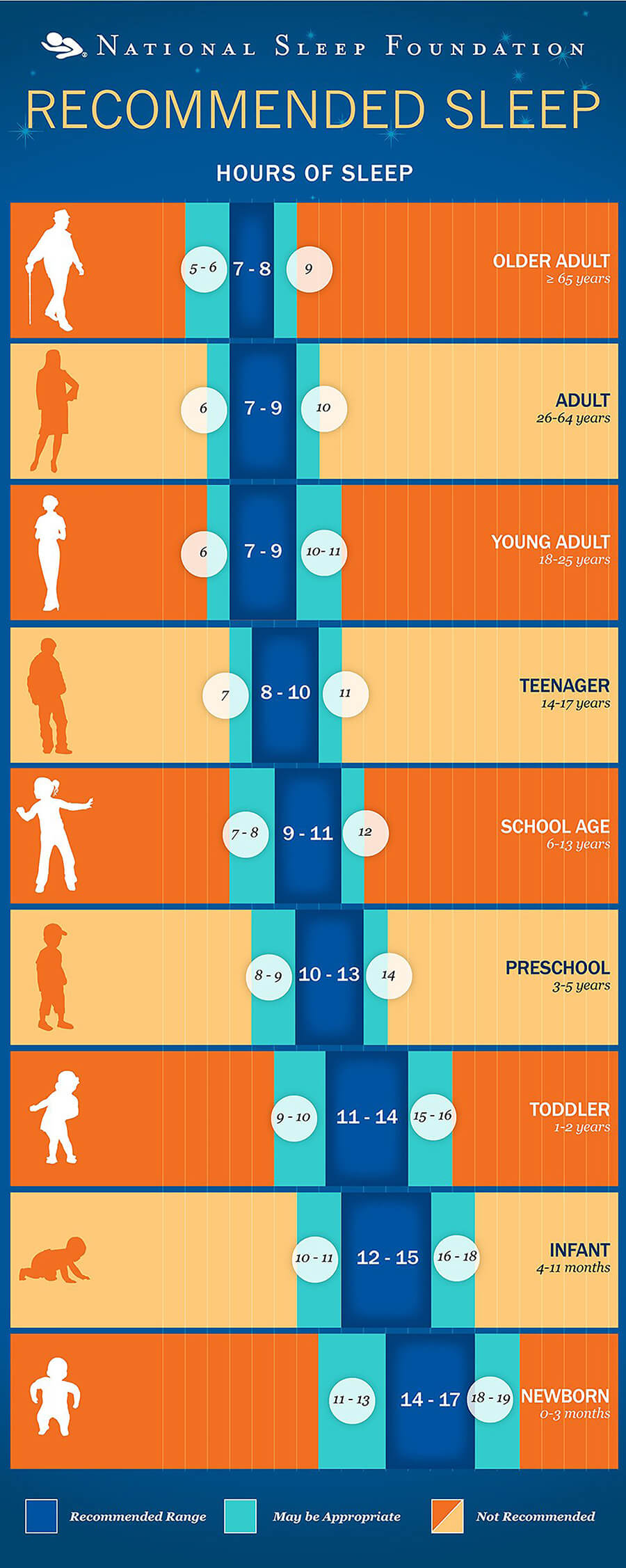How Much Sleep Do You Really Need Each Night?

According to Dr. Jose Colon, about 4-6 nocturnal awakenings are considered normal for the average person. This goes back to our caveman days when we needed to wake up to ensure our safety. However, after these short periods of staying awake, we should be able to go back to sleep easily. If you can’t fall asleep immediately, there are probably some things that prevent you from getting a good night’s rest.
Bright Side made a list of the most common reasons why you may wake up in the middle of the night and have trouble falling back asleep.
It’s probably happened to you thousands of times over the course of your life.
With a sudden jolt, you’re wide awake. You open your eyes and feel a little disoriented. It’s still dark.
You wonder, “how long have I been asleep?” You turn over and check your clock only to find that you have awoken at exactly the wrong time.
It can be annoying, especially if you’re wide awake, unable to return to sleep.
But when you stop and think about it, there might be a good reason for why you’re suddenly waking up in the middle of the night.
The time of the night that you wake up actually has a great deal of meaning when you dive in and begin to understand it.
According to feng shui, an ancient Chinese practice, different hours of the night are associated with different aspects of your body and your mind.
Let’s break down what each time of the night means for you.
It’s hands down the most annoying time to wake up.
You probably haven’t been asleep for very long and now you have to start all over again with trying to fall back asleep.
But there may be something deeper happening that you’re not quite realizing. If you’re waking up between 9 and 11pm, it could be an issue with your thyroid.
During this time of sleep, your body’s homeostasis is being rebalanced.
This is an average time that most people try to fall asleep. This is the time that our endocrine system rebalances and enzymes are replenished.
The endocrine system manages hormones and metabolism. If you have trouble falling asleep at this time, you could be stuck in a flight or fight mode.
You are still mentally stuck in the events of the day or already preparing for tomorrow’s challenges.
Repeat positive mantras, and release the formations causing you tension.
So if you’re having trouble falling asleep and staying asleep, it may mean that your body, and specifically your thyroid, is having trouble restoring your body’s balance in preparation for a good night’s sleep.
If this is an issue, consider avoiding gluten for a short period of time and consume cruciferous vegetables raw if possible.
It could mean a few different things.
It’s not uncommon for the body to jolt awake around this time if you’ve had caffeine a little too late in the day or had a few too many beers after dinner.
But there could be something else going on in your body causing you to wake up during this time.
Around this time of the night, your gall bladder is hard at work making sure your body is ready to digest the next day’s food.
Something could be irritating your gall bladder if you’re waking up around this time, especially if your stomach is a little upset as well.
If you wake often at this time it may be due to resentments you carry. This is the time in the 24 hour cycle that yin energy is turned into yang.
Yang energy is highly active, and your body is supposed to be storing this energy for the next day.
Reinforce self love and appreciation, doing your best to stay calm and conserve energy.
This is physically when the gallbladder is breaking down fats. You maybe are getting too much unhealthy fats or oils.
You may want to lay off fatty foods, high fat meats, butter, creamy foods, and chocolate before bed, or in general, if you’re waking up between 11pm and 1am.
The cause could be rooted in your emotions or your body. Usually during this time, you’ve had one to two full sleep cycles.
If your dreams have been harsh, like dreams of reliving painful experiences that have happened to you, it’s not uncommon for the body to wake to give you time to process what you’ve been dwelling on.
But the issue could be internal as well.
The liver is always at work detoxing your blood and making up for some of your dietary mistakes.
If waste isn’t being eliminated properly, you could find yourself waking around this time due to the strain put on your liver.
This is a crucial time for the body’s detoxification and renewal process. Your liver is breaking down toxins and releasing toxins, while making fresh blood.
Waking during this time is normally indicative of anger, frustration and negative formations.
If you are not addressing these spiritual toxins, then your spiritual ‘liver’ is trying to call attention to these problems.
If you’re concerned about your liver health, obviously go see a doctor.
But in the meantime, you can eat foods like leafy vegetables, avocados, citrus fruits, and garlic to maintain good liver health.
Wrong sleeping position
Symptoms such as chronic fatigue, headaches, heartburn, and neck or back pain may be caused by improper posture while you sleep. You should also pay attention to your bed — your mattress shouldn’t be too hard, but it shouldn’t be too soft, either. Check to make sure that your pillow supports your neck and your head, as well.
What to do: According to Dr. John Douillard, sleeping on your left side can improve your digestion and blood circulation, promote emotional health, help your lymphatic system work properly, and prevent heart diseases.
If you can’t change your sleeping habits completely, try to follow some simple tips:
• If you sleep on your back, put a pillow under your knees to take pressure off your lower back.
• If you sleep on your side, put one pillow underneath your armpit to support your arm and another one between your legs to keep your spine aligned.
• If you sleep on your stomach, use a thin pillow or no pillow at all.
You can find a complete guide on how to choose the perfect pillow and mattress to improve your sleep quality.
Environmental noise
If you live in a large city, you know what it’s like to be exposed to various noises day and night. Your bed partner’s alarm ringing, a neighbor turning on the radio every morning, a bus or a train passing by, children or pets playing around — all these noises can significantly ruin the quality of your sleep.
What to do: Use earplugs while you sleep, but don’t forget that foam earplugs have a really short life span. You should also clean them on a regular basis.
If disturbing sounds are coming from your neighbors or from outside, you can soundproof the wallsof your room to sleep comfortably.
Sleep apnea
Sleep apnea means that the airways become partially or completely blocked and this can cause you to repeatedly stop breathing at night. In this case, your awakening is caused by a drop in the blood oxygen level. Among other symptoms of apnea, you may experience headaches, dry mouth, chest pain, excessive sleepiness, and mood swings.
What to do: If the diagnosis is confirmed, doctors may advise you to use a continuous positive airway pressure device to keep your airway open as you sleep.
In some cases, an orthognathic surgery may help you ease the breathing process by correcting the position of your tongue and your jaw.
Restless legs syndrome
If you wake up with a strong urge to move your legs, you probably have restless legs syndrome (RLS). This neurological problem may cause itching, crawling, or a creeping sensation in your legs. Sometimes, you may even feel aching or throbbing pain in your lower limbs.
What to do: Leg massages, moderate exercise, and warm baths may relieve the symptoms of RLS. If you suffer from significant sleep deprivation, you can change your sleep patterns by napping during the day.
Wrong room temperature
If you find yourself waking up in the middle of the night because you’re either too cold or too hot, the issue would be your room temperature. As a rule, your body temperature needs to dip a bit to get you into sleep mode, but it doesn’t mean that your room should be freezing.
What to do: According to the National Sleep Foundation, the ideal room temperature for a good night’s sleep ranges from 60° F to 67° F. For babies or toddlers, it’s between 65° F and 70° F.
You can also try taking a warm bath before bed. First, it will raise your body temperature and then, after you get out of the tub, you’ll experience a slight drop in temperature, which will send the “sleep” signal to your brain.
Drinking alcohol
Although alcohol has a sedative effect that can put you to sleep quite easily, it can actually be a reason for your restless nights. As your body metabolizes the alcohol in your system, the quality of your sleep may worsen, you may start stirring often, and you may even wake up in the middle of the night.
What to do: Avoid drinking at least an hour before you go to bed. Instead, drink a cup of camomile tea — it will help you sleep better.



